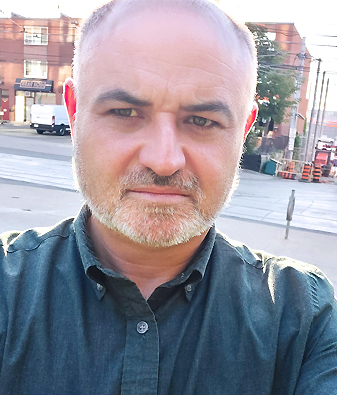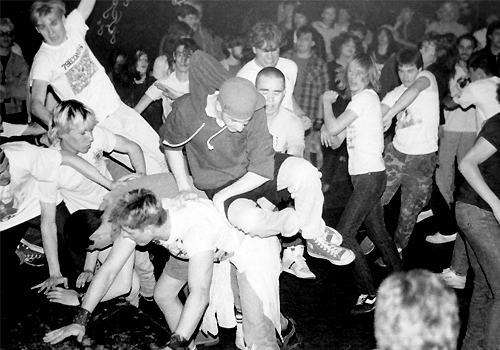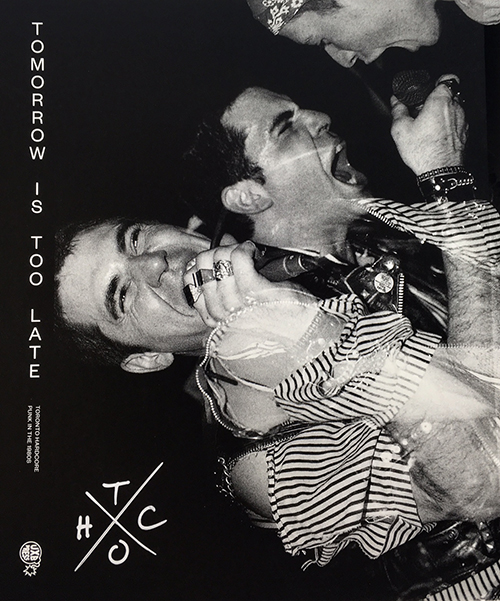Before his history degree was even complete, Faculty of Arts & Science alumnus Simon Harvey was already putting his studies into practice as a contributing author of what would be a multi-award-winning oral history and coffee table book.
Published in October 2018, Tomorrow is Too Late earned a 2019 Toronto Heritage Award for its “visually stunning and engaging” account of the 1980s Toronto hardcore punk scene — a scene Harvey had been part of some 35 years earlier.
“It’s a natural fit for me to want to bring together history and punk rock, and I would absolutely say there was an influence from my U of T history studies. I think it was unavoidable,” says Harvey, who earned his bachelor of arts degree in 2019 as a mature student and member of Woodsworth College.

“I was fortunate to have some really superb professors in fields that, unlikely as it seems on the surface, ended up having some relevance to what we were doing with this book,” he says, referencing classes with Professor Emeritus Robert Johnson and Professors Thomas Lahusen, Lynne Viola and Andres Kasekamp that had a positive impact on this work. Harvey also benefitted from student financial support at U of T including the Edith M. Waters Bursary, Alayne and Kenneth Christie Award and Woodsworth College Grant.
“Lahusen was writing about cultural history, and we were writing about cultural history with Tomorrow,” says Harvey. “Robert Johnson and Lynne Viola were both superb in terms of teaching me about archives and the importance of primary sources. These classes gave me respect for the idea of maintaining provenance and retaining the integrity of what you’re dealing with. That certainly went into my part in making this book.”
Documenting punk rock has always been important to Harvey. In the 1980s, he interviewed bands and covered gigs for his fanzine, a do-it-yourself, cut-and-paste publication popular in the 1980s punk scene. Since 1998, he has re-issued rare Canadian punk records through his own label, Ugly Pop Records. He joined Tomorrow is Too Late when research and writing was already underway by co-authors Shawn Chirrey, who earned his master of health science from U of T in 1998, and musician Derek Emerson.
Don’t be fooled by the book’s raw and chaotic subject matter; the writers were committed to methodically and accurately capturing history. Interviews with some 150 subjects spanned over two years, many at CIUT, U of T’s radio station. The book is the result of more than one million words being boiled down to roughly 120,000. It is packed with rare photos, hand-drawn gig posters, ticket stubs and other artifacts.

While Harvey conducted some interviews and assisted with choosing photos, editing and fact-checking, the bulk of his role involved writing passages that contextualized what was going on historically, musically and locally at the time.
Kasekamp taught Harvey in his third-year History of Fascism course and says his studies certainly would have translated to his work on the book.
“An education in history as a whole develops critical thinking, particularly a critical approach to the sources, which is very important if you're writing a book or any sort of longer piece that is based on interviews and sources,” says Kasekamp.
“I realized right away that Simon was a special guy; he was asking a lot of questions, and he was bright — it was clear he was already mature in his writing and analytical skills.”
Kasekamp and Harvey later learned they have a mutual friend in Stephen Perry, also involved in Tomorrow is Too Late and co-host of the Equalizing X Distort radio program on CIUT since 1998. Kasekamp has his own past as a punk fan, and Perry had called upon him when he was doing a series on punk rock in Eastern European countries under communism.

Tomorrow is Too Late immediately struck a chord with readers. The book’s first print run of 1,000 copies sold out in about three weeks, and the second run of 500 copies followed suit. While the team was surprised by the awards, the book’s success wasn’t entirely a shock.
“I think we knew what we were doing had some importance,” Harvey says. “It's Toronto cultural history and underground music history and punk rock history; they're all things I care about.
“In the big picture, I don't know if it's the most important endeavour of 2018 in the world. After all, it’s a book about teenagers with funny haircuts jumping around making noise,” he says with a smile. “Having said that, it really did shape a lot of people's lives and continues to shape things in the broader culture.”
The team is about to launch Eve of Darkness, a similarly structured oral history about underground heavy metal music in Toronto in the 1980s.
“The biggest thing we learned from the first book was that, yes, we were going to find what we’d think is a million and a half words of printable content, but we would have to say it in 10 per cent of that” Harvey says. “There’s so much history in this stuff; you could fill telephone books with it.”

